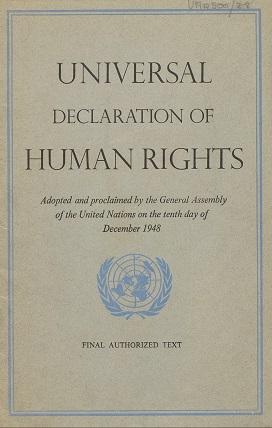On December 6th, 2018 the Economic, Social and Cultural Rights Initiative and the Community Platform are marking the 70th anniversary of the Universal Declaration of Human Rights, with an event entitled ‘Declaring our Human Rights’, in the Irish Human Rights & Equality Commission.
The Universal Declaration of Human Rights was adopted in 1948 as a moral beacon for a world emerging from the unconscionable horrors of war and social degradation visited on nations, communities and families across the world over the preceding decades.
Many countries, including Ireland, still struggle to achieve the goals set out in the Universal Declaration while others are discarding established rights. It is therefore proper and timely that we acknowledge the massive achievement in setting down the global ethic that is the Universal Declaration of Human Rights (UDHR).
In the Preamble to the Declaration it states:
“Whereas recognition of the inherent dignity and of the equal and inalienable rights of all members of the human family is the foundation of freedom, justice and peace in the world,
Whereas disregard and contempt for human rights have resulted in barbarous acts which have outraged the conscience of mankind, and the advent of a world in which human beings shall enjoy freedom of speech and belief and freedom from fear and want has been proclaimed as the highest aspiration of the common people,
Whereas it is essential, if man is not to be compelled to have recourse, as a last resort, to rebellion against tyranny and oppression, that human rights should be protected by the rule of law,
Whereas it is essential to promote the development of friendly relations between nations,
Whereas the peoples of the United Nations have in the Charter reaffirmed their faith in fundamental human rights, in the dignity and worth of the human person and in the equal rights of men and women and have determined to promote social progress and better standards of life in larger freedom,
Whereas Member States have pledged themselves to achieve, in co-operation with the United Nations, the promotion of universal respect for and observance of human rights and fundamental freedoms,
Whereas a common understanding of these rights and freedoms is of the greatest importance for the full realization of this pledge,
Now, Therefore THE GENERAL ASSEMBLY proclaims THIS UNIVERSAL DECLARATION OF HUMAN RIGHTS as a common standard of achievement for all peoples and all nations, to the end that every individual and every organ of society, keeping this Declaration constantly in mind, shall strive by teaching and education to promote respect for these rights and freedoms and by progressive measures, national and international, to secure their universal and effective recognition and observance, both among the peoples of Member States themselves and among the peoples of territories under their jurisdiction.”
Article 2 of the Declaration states: “Everyone is entitled to all the rights and freedoms set forth in this Declaration, without distinction of any kind, such as race, colour, sex, language, religion, political or other opinion, national or social origin, property, birth or other status. Furthermore, no distinction shall be made on the basis of the political, jurisdictional or international status of the country or territory to which a person belongs, whether it be independent, trust, non-self-governing or under any other limitation of sovereignty.”
One significant way Ireland could mark the seventieth year of this Declaration would be to include a socio-economic status ground into our equality legislation; this in turn would strengthen the roll-out of the Public Sector Duty established under the Irish Human Rights and Equality Commission Act, 2014.
Of particular interest to the INOU are Articles 22; 23; 25; and 26.
Article 22 states: “Everyone, as a member of society, has the right to social security and is entitled to realization, through national effort and international co-operation and in accordance with the organization and resources of each State, of the economic, social and cultural rights indispensable for his dignity and the free development of his personality.”
Article 23 focuses in “on the right to work, to free choice of employment, to just and favourable conditions of work and to protection against unemployment.”
Article 25 covers “the right to a standard of living adequate for the health and well-being of himself and of his family, including food, clothing, housing and medical care and necessary social services, and the right to security in the event of unemployment, sickness, disability, widowhood, old age or other lack of livelihood in circumstances beyond his control.”
Article 26 “the right to education” and states that “Education shall be directed to the full development of the human personality and to the strengthening of respect for human rights and fundamental freedoms.”
To read the full Declaration please click here http://www.un.org/en/universal-declaration-human-rights/
